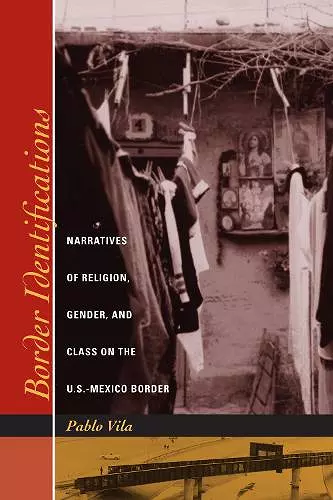Border Identifications
Narratives of Religion, Gender, and Class on the U.S.-Mexico Border
Format:Paperback
Publisher:University of Texas Press
Published:1st Aug '05
Currently unavailable, and unfortunately no date known when it will be back

"This book is a great contribution to different fields: sociology of culture, identity theories, border studies, multiculturalism, gender studies, religious studies, cultural studies, and postmodern theory. It is also an important critique to a current within postcolonial theory that uses hybridity as a central concept." -- Eduardo Barrera, Associate Professor of Communication, University of Texas at El Paso
How the stories people tell about religion, gender, and class define identities on both sides of the U.S.-Mexico border.
From poets to sociologists, many people who write about life on the U.S.-Mexico border use terms such as "border crossing" and "hybridity" which suggest that a unified culture—neither Mexican nor American, but an amalgamation of both—has arisen in the borderlands. But talking to people who actually live on either side of the border reveals no single commonly shared sense of identity, as Pablo Vila demonstrated in his book Crossing Borders, Reinforcing Borders: Social Categories, Metaphors, and Narrative Identities on the U.S.-Mexico Frontier. Instead, people living near the border, like people everywhere, base their sense of identity on a constellation of interacting factors that includes regional identity, but also nationality, ethnicity, and race.
In this book, Vila continues the exploration of identities he began in Crossing Borders, Reinforcing Borders by looking at how religion, gender, and class also affect people's identifications of self and "others" among Mexican nationals, Mexican immigrants, Mexican Americans, Anglos, and African Americans in the Cuidad Juárez-El Paso area. Among the many fascinating issues he raises are how the perception that "all Mexicans are Catholic" affects Mexican Protestants and Pentecostals; how the discourse about proper gender roles may feed the violence against women that has made Juárez the "women's murder capital of the world"; and why class consciousness is paradoxically absent in a region with great disparities of wealth. His research underscores the complexity of the process of social identification and confirms that the idealized notion of "hybridity" is only partially adequate to define people's identity on the U.S.-Mexico border.
ISBN: 9780292705838
Dimensions: 229mm x 152mm x 20mm
Weight: 454g
312 pages